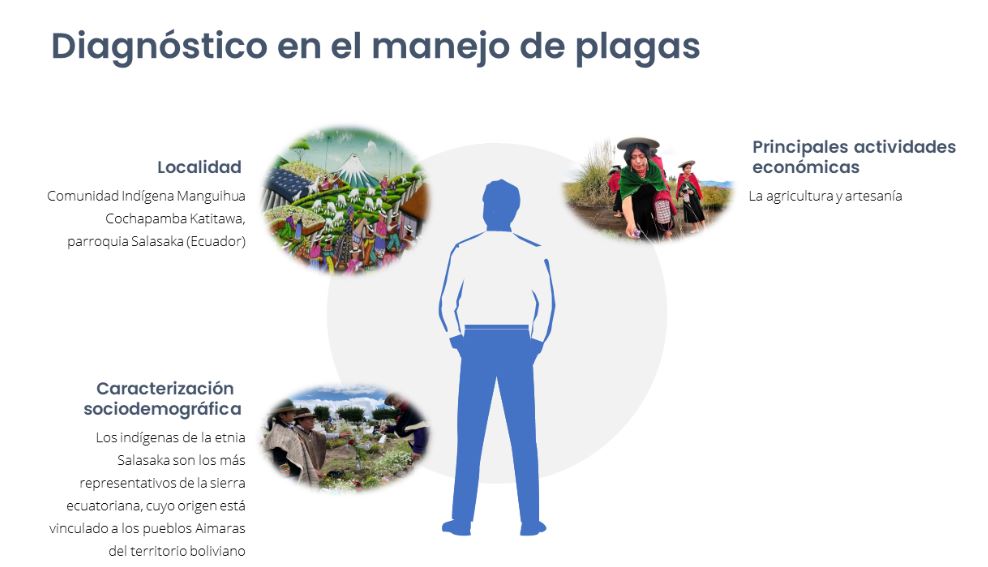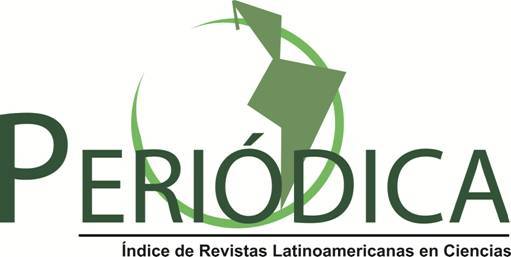Farmers’ perception and knowledge about sustainable pest management in an indigenous community, Salasaka, Ecuador
DOI:
https://doi.org/10.18633/biotecnia.v27.2549Keywords:
Pest management knowledge, use of pesticides, biological control, indigenous agricultural systemsAbstract
The agrarian tradition of Salasaka in Ecuador is characterized by its ancestral heritage. However, the use of chemical inputs and the monoculture have led to a decline in productive capacity. This study evaluated the perception of Salasaka farmers regarding the use of chemical pesticides and their knowledge of sustainable agricultural pest management strategies. A cross-sectional study was conducted using a structured questionnaire applied to agricultural producers from the Manguihua Cochapamba Katitawa Community (Salasaka parish). The results showed that 60 % of farmers believe pesticides are effective for rapid pest and disease control, as well as for increasing productivity and stimulating plant growth. However, farmers also perceive negative aspects such as high cost (73.3 %), potential harm during handling (46.7 %), and environmental damage (73.3 %). Despite a high proportion of farmers claiming to know about sustainable pest control alternatives, only a small percentage use them. This highlights the need for the development and implementation of training programs to demonstrate the potential of sustainable pest control practices.
Downloads
References
Abrol, D.P. y Shankar, U. 2012. History, overview and principles of ecologically-based pest management. En: Integrated Pest Management: Principles and practice. D. P. Abrol y U. Shankar (eds.), pp. 1–26. CAB International. Oxfordshire. https://doi.org/10.1079/9781845938086.0001
Ali, M.P., Kabir, M. M.M., Haque, S.S., Qin, X., Nasrin, S., Landis, D., Holmquist, B. y Ahmed, N. 2020. Farmer’s behavior in pesticide use: Insights study from smallholder and intensive agricultural farms in Bangladesh. Science of the Total Environment. 747: 141160. https://doi.org/10.1016/j.scitotenv.2020.141160
Centner, T.J. 2021. Pesticide usage is compromising people’ s health in the United States: ideas for reducing damages. Agriculture. 11: 1–12. https://doi.org/10.3390/agriculture11060486
Colmenarez, Y.C. y Vásquez, C. 2024. Benefits associated with the implementation of biological control programmes in Latin America. BioControl. 69: 303–320. https://doi.org/10.1007/s10526-024-10260-7
Colmenarez, Y.C., Vásquez, C., Corniani, N. y Franco, J. 2016. Implementation and adoption of integrated pest management approaches in Latin America: Challenges and potential. En: Integrated Pest Management (IPM): Environmentally Sound Pest Management. H. Gill (ed.), pp 1–19. InTech. Riejka. https://doi.org/10.5772/64098
Emery, S.E., Jonsson, M., Silva, H., Ribeiro, A. y Mills, N.J. 2021. High agricultural intensity at the landscape scale benefits pests, but low intensity practices at the local scale can mitigate these effects. Agriculture, Ecosystems and Environment. 306: 107199. https://doi.org/10.1016/j.agee.2020.107199
FAO. 2023. ′Andean Chakra′: An ancestral agricultural system of kichwas cotacachi communities. [Consultado 31 marzo 2025] Disponible en: https://openknowledge.fao.org/server/api/core/bitstreams/93641598-5658-4c7b-aa67-105439d35f90/content
Fawzy, Z.F. y Shedeed, S.I. 2020. Subsistence farming towards sustainable economic agriculture of small farmers in the developing countries. NASS Journal of Agricultural Sciences. 2 (1): 1–3. https://doi.org/10.36956/njas.v2i1.16
Gagic, V., Hänke, S., Thies, C., Scherber, C., Tomanović, Ž. y Tscharntke, T. 2012. Agricultural intensification and cereal aphid-parasitoid-hyperparasitoid food webs: Network complexity, temporal variability and parasitism rates. Oecologia. 170(4): 1099–1109. https://doi.org/10.1007/s00442-012-2366-0
Hernández-Sampieri, R., Fernández-Collado, C. y Baptista-Lucio, P. 2014. Metodología de la Investigación. Sexta edición. McGraw-Hill/Interamericana Editores, S.A. México DF.
Jerez, A.K. 2020. Estudio de las técnicas ancestrales de la comunidad Salasaka provincia Tungurahua. Tesis de Grado. Universidad Regional Autónoma de los Andes “Uniandes”. Ambato.
Khadda, Z. Ben, Fagroud, M., El Karmoudi, Y., Ezrari, S., Berni, I., De Broe, M., Behl, T., Bungau, S.G. y Houssaini, T. S. 2021. Farmers’ knowledge, attitudes, and perceptions regarding carcinogenic pesticides in fez Meknes region (Morocco).
International Journal of Environmental Research and Public Health 18: 10879. https://doi.org/10.3390/ijerph182010879
Kumar, J., Ramlal, A., Mallick, D. y Mishra, V. 2021. An overview of some biopesticides and their importance in plant protection for commercial acceptance. Plants.10: 1–15. https://doi.org/10.3390/plants10061185
Manobanda, M., López, P. y Vásquez, C. 2022. Bioecología de Bactericera cockerelli (Sulc.) en el cultivo de papa (Solanum tuberosum L.) en las provincias de Tungurahua y Cotopaxi, Ecuador. Investigación Agraria. 24(2): 70–80. https://doi.org/10.18004/investig.agrar.2022.diciembre.2402707
Martínez-Sastre, R., García, D., Miñarro, M. y Martín-López, B. 2020. Farmers’ perceptions and knowledge of natural enemies as providers of biological control in cider apple orchards. Journal of Environmental Management. 266: 110589. https://doi.org/10.1016/j.jenvman.2020.110589
Masaquiza, A. 2020. Estudio de las técnicas ancestrales de la comunidad Salasaka provincia Tungurahua. Tesis de Grado. Universidad Regional Autónoma de los Andes UNIANDES, Ambato.
Otzen, T. y Manterola, C. 2017. Técnicas de muestreo sobre una población a estudio. International Journal of Morphology. 35(1): 227–232. https://doi.org/10.4067/S0717-95022017 000100037
Parliament European. 2021. The use of pesticides in developing countries and their impact on health and the right to food. Rept. PE 653.622. European Union. Bruselas.
Parsa, S., Morse, S., Bonifacio, A., Chancellor, T.C.B. y Condori, B. 2014. Obstacles to integrated pest management adoption in developing countries. Proceedings of the National Academy of Sciences. 111(10): 3889–3894. https://doi.org/10.1073/pnas.1312693111
Pilla, M. 2014. La actividad agrícola y su impacto en el desarrollo económico local en la Parroquia Salasaka, Cantón Pelileo, Provincia Tungurahua en el año 2014. Tesis de Grado. Universidad Técnica de Ambato, Ambato.
Prado, J. y Gómez, M. 2018. Agentes de control biológico: componentes de un manejo agroecológico en las chacras. En: Sembrando vida y cultura. Las chacras como espacios multifuncionales en comunidades indígenas andinas. Caso: Fakcha Llakta. J. Aranguren y J. Moncada (eds), pp 112–131. Universidad Técnica del Norte, Otavalo, Ecuador.
Quispe, M. 2021. Diseño de un sistema lúdico para la difusión intercultural de la cultura Salasaka. Tesis de Maestría. Universidad Católica del Ecuador, Ambato.
Rahman, M. y Rashid, M. 2020. Farmers’ perception of integrated pest management and its impact on cucumber production in Bangladesh. Journal of Bangladesh Agricultural University. 18(3): 674–679. https://doi.org/10.5455/jbau.58830
Rath, S. 2021. Subsistence farming and commercial farming: the two facets of agriculture. Agriculture & Food: e-Newsletter. 3(3): 283–285.
Samada, L.H. y Tambunan, U.S.F. 2020. Biopesticides as promising alternatives to chemical pesticides: A review of their current and future status. OnLine Journal of Biological Sciences. 20(2): 66–76. https://doi.org/10.3844/ojbsci.2020.66.76
Sharma, A., Singh, D., y Solanki, G.S. 2014. Role of farm women in agricultural operations and decision-making pattern. Indian Research Journal of Extension Education, 14(2): 60–63. https://doi.org/10.15740/has/arjss/5.2/242-244
Siaw, S.Y., Norsida, M., Ramli, N.N., Yusuf, M.S.A. y Umar, A. 2024. The contribution of agricultural extension to empowerment of women for agricultural development. Journal of Agricultural Extension. 28(2): 66–84. https://doi.org/10.4314/jae.v28i2.7
Sreenivasa-Rao, C. 2019. Ecologically sustainable strategies for pest management. Extension Digest. 3(1): 1–32.
Staudacher, P., Fuhrimann, S., Farnham, A., Mora, A.M., Atuhaire, A., Niwagaba, C., Stamm, C., Eggen, R.I.L. y Winkler, M.S. 2020. Comparative analysis of pesticide use determinants among smallholder farmers from Costa Rica and Uganda. Environmental Health Insights. 14: 1–15. https://doi.org/10.1177/1178630220972417
van Lenteren, J.C., Bueno, V.H.P., Luna, M.G. y Colmenarez, Y.C. 2020. Biological control in Latin America and the Caribbean: information sources, organizations, types and approaches in biological control. En: Biological Control in Latin America and the Caribbean: Its Rich History and Bright Future. J.C. van Lenteren, V.H.P. Bueno, M.G. Luna y Y.C. Colmenarez (eds.), pp. 1–19. CAB International, Oxfordshire.
Wyckhuys, K.A.G., Heong, K.L., Sanchez-Bayo, F., Bianchi, F.J.J.A., Lundgren, J.G. y Bentley, J.W. 2019. Ecological illiteracy can deepen farmers’ pesticide dependency. Environmental Research Letters, 14(9), 1–35. https://doi.org/10.1088/1748-9326/ab34c9
Zhang, W. 2018. Global pesticide use: Profile, trend, cost/benefit and more. Proceedings of the International Academy of Ecology and Environmental Sciences. 8: 1–27.
Zhao, Z., Reddy, G.V.P., Hui, C. y Li, B. 2016. Approaches and mechanisms for ecologically based pest management across multiple scales. Agriculture, Ecosystems and Environment. 230: 199–209. https://doi.org/10.1016/j.agee.2016.06.010

Downloads
Published
How to Cite
Issue
Section
License
Copyright (c) 2025

This work is licensed under a Creative Commons Attribution-NonCommercial-ShareAlike 4.0 International License.
The journal Biotecnia is licensed under the Attribution-NonCommercial-ShareAlike 4.0 International (CC BY-NC-SA 4.0) license.




_(1)_(1).png)






_(2).jpg)





